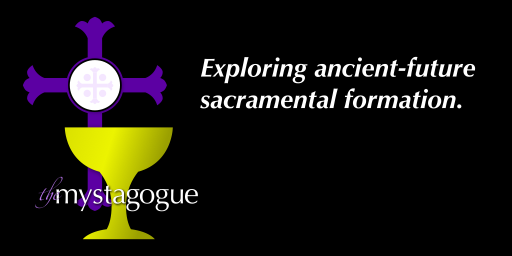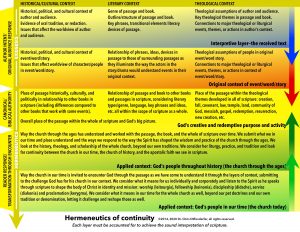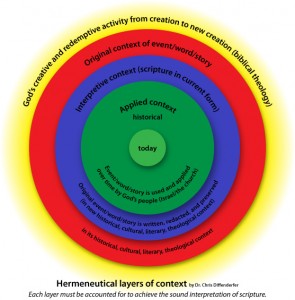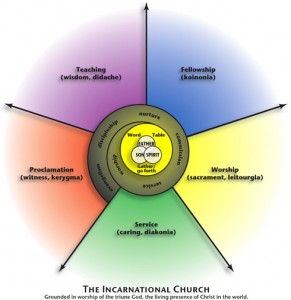Romans 6.1-11
From the days Christ himself commanded that his disciples “Go therefore and make disciples of all nations, baptizing them in the name of the Father and of the Son and of the Holy Spirit…,” the church has been obediently baptizing new converts (Matt. 28.19–20, NRSV). From the day of Pentecost, when Peter spoke, full of the Spirit, and “…those who welcomed his message were baptized,” the apostles, and the apostolic church that followed, were true to Christ’s own example and command and brought all who would repent into the community of faith through baptism (Acts 2.41). In fact, virtually no account of conversion in the New Testament is relayed without reference to the immediate, even concurrent, baptism of the new believer.
Of the people in Samaria to whom Philip was proclaiming the gospel, we read in Acts 8, “they were baptized, both men and women” (8.12). Even Simon the magician, “believed, and after being baptized, he stayed with Philip…” (8.13). Shortly after Philip opened up the scriptures to the Ethiopian Eunuch, who with urgency was baptized along the road, the blinded Saul obediently sought out Ananias, had his sight restored, and was told, “And now why do you delay? Get up, be baptized, and have your sins washed away, calling on his name” (8.26-39; 22.16). Cornelius and his entire household, and the jailor from whom Paul and Silas were delivered, and his entire family were all baptized into the great and wonderful journey of life in Christ and his church (10.22-48;16.25-34).
Throughout the New Testament, no other ritual or practice is mentioned or alluded to more than baptism. It’s as important to the new covenant as circumcision was to the old. Its imagery hearkens back to the waters of creation, the water for the thirsty in the desert, and the prophesied outpouring of the Spirit. It’s the act which Peter says was prefigured by the flood through which Noah and his family was saved and which “now saves you—not as a removal of dirt from the body, but as an appeal to God for a good conscience, through the resurrection of Jesus Christ,” and that Anglican John Wesley called “…the initiatory sacrament, which enters us into covenant with God…perpetually obligatory on all Christians…” (1 Peter 3.20-22; Wesley, Treatise on Baptism, I.1).
Baptism is one of only two sacraments enjoined by the entire church from its earliest days to its latest years. And it’s the one event in the life of the believer that happens but once and yet is to be remembered for a lifetime. “Remember your baptism,” is the cry of the ancient ritual, accompanied in some traditions by the splash of water across the faces and shoulders of the congregation from a soaked branch of hyssop.
What is so important about this ritual of getting wet that is worth such urgency and remembrance? And why have so many Christians in recent years then treated it so lightly, as so much empty words and actions, that they have ignored the command of Christ, the witness of scripture, and the example of the early church and treated baptism as incidental or even unnecessary?
The answer to both questions, as you might expect, can be found in scripture, especially in the person to whom it gives witness. “In the beginning,” John tells us, “was the Word, and the Word was with God, and the Word was God” (1.1). “…the Word became flesh and lived among us,” and John the Baptist, he who baptized for repentance and foretold the coming of the Word, baptized Jesus, the Word himself (1.14).
The first quiet and miraculous act by Jesus, the incarnate Word, was to change the water in the jars of purification, water set aside for washing away uncleanness, symbols of the cleansing of sin and defilement, into wine—new, pure wine from Jesus, the incarnate word, a foreshadow of the wine of his own blood that would be shed for our purification (John 2.1-11).
Shortly after, in the still of the night, Jesus reveals to a confused and seeking pharisee the mystery of rebirth by water and the spirit, a strange notion made even more mysterious as he connects it with eternal life found in belief in himself, the incarnate Word of God (John 3.1-21). What follows is a dispute over the new baptism of Jesus and his disciples and the continuing baptism of John the Baptist in which John helps his perplexed disciples understand his own secondary importance to the incarnate Word, through whom the Spirit is given and eternal life found (3.25-30). And then in chapter 4, the incarnate Word, whose disciples have been baptizing in his name, superseding John and annoying the pharisees, sits at the ancient well of Jacob in Samaria, the favored source of water for the thirsty, and offers himself to an outcast and sinful women as “a spring of water gushing up to eternal life” (4.14).
As the Word incarnate and the living water returns to Cana, where, we are reminded, “he had changed the water into wine,” Jesus heals the son of a desperate government official who is near death (4.46-54). Then in chapter 5, by the pool of Bethsaida, Jesus the living water heals the man who cannot make it to the waters that heal (5.2-15).
Do you see it? Do you grasp it?
Only a short time later, after he feeds thousands with abundance out of scarcity, and after he stills the chaotic waters of a raging sea, Jesus utters the words we use so often in that other great sacrament—eucharist:
Very truly I tell you, unless you eat of the flesh of the Son of Man and drink of his blood, you will have no life in you. Those who eat my flesh and drink my blood have eternal life, and I will raise them up on the last day; for my flesh is true food and my blood is true drink. (6.53–55)
The bread of life and the living water!
Jesus, the Word incarnate, God among us in the flesh, the very agent and substance of creation, has made everything new—even the water of birth, of satisfaction of thirst, of healing. Jesus even masters the waters of chaos in the storm (John 6.16-21).
So what is so important about this ritual of getting wet that is worth such urgency and remembrance? Jesus Christ himself!
Baptism is the wonderful, physical symbol, that points beyond itself to the to the great mystery and spiritual reality of the new life of the incarnate Christ! Christ, who is the spiritual reality of God given to the world in and through the physical reality of creation—which is what we call “incarnation”—is at the very center of the action we call baptism that is given all meaning and substance by the work of Christ. Jesus Christ himself, the living water, is the person who is the very substance and center of our baptism!
And so Paul not only assumes that we have been baptized in full obedience, he recalls our baptism again and again in order to make sure we live our baptism.
What then are we to say? Should we continue in sin in order that grace may abound? By no means! How can we who died to sin go on living in it? Do you not know that all of us who have been baptized into Christ Jesus were baptized into his death? Therefore we have been buried with him by baptism into death, so that, just as Christ was raised from the dead by the glory of the Father, so we too might walk in newness of life.
For if we have been united with him in a death like his, we will certainly be united with him in a resurrection like his. We know that our old self was crucified with him so that the body of sin might be destroyed, and we might no longer be enslaved to sin. For whoever has died is freed from sin. 8But if we have died with Christ, we believe that we will also live with him. We know that Christ, being raised from the dead, will never die again; death no longer has dominion over him. The death he died, he died to sin, once for all; but the life he lives, he lives to God. So you also must consider yourselves dead to sin and alive to God in Christ Jesus. (Romans 6.1-11)
Amen and amen!
Then why have so many of us in recent years ignored the command of Christ, the witness of scripture, and the example of the early church and treated baptism as incidental or even unnecessary? And why have those of us who have been baptized and who would never question the reality of the grace of God and the regenerative activity of his Spirit in the sacrament, trivialized it by the way we live our lives?
I think the answer also lies in what we read in John, and Paul’s letters, and even the Old Testament. When so many have emptied our lives and the church of a living faith in the living Christ and have separated the ritual from the living, saving work of Christ Paul described in Romans, we have reduced baptism to a meaningless external form and have sought the internal work everywhere but the place God intends to offer it. As we have sought the newness of Christ as shown through the witness of the New Testament, and as we’ve looked for the spiritual promise of the new covenant, we have forgotten the power and meaning of the incarnation and the fact that Christ’s redemption touches all of life—body and spirit.
In other words, anyone who insists that the performance of baptism is enough to save without a real and personal participation in and knowledge of the one to whom it points, is not obedient to the Lord they claim to serve. And anyone who treats baptism lightly and insists on being able to enjoy a saving and growing relationship with the incarnate and living Word while ignoring his command, the witness of the apostles, and the example of the early church is not obedient to the Lord they claim to serve.
Baptism is nothing without Christ, but without baptism, we risk living without Christ. Baptism directs us to Christ and marks us as his own. Through the powerful physical symbol of submersion under the water and the activity of Christ himself, baptism embodies the truth of our death to sin and life in Christ and the reality of life giving and cleansing presence of the living water in our lives. Baptism embodies
…the power of Christ over the waters of chaos that would otherwise overwhelm us.
…the wellspring of the Spirit of Christ and the new creation he makes of us.
…the unity of all who are baptized into Christ Jesus, who bear his name and his cross.
Wrapped up in the mystery of the incarnation, the water and the Spirit, is the great sacrament of our new birth that marks the real change in our lives and participation as new creatures in the community and Kingdom of our victorious Lord. Through baptism into the death and resurrection of our Lord, we partake in his victory over sin and death, over the powers of this world. And beginning with our baptism, we live the fullness of new life even as we rejoice in the promise of eternal life in the world to come.
And so again we hear from Paul, this time in his letter to the Colossians.
See to it that no one takes you captive through philosophy and empty deceit, according to human tradition, according to the elemental spirits of the universe and not according to Christ. For in him the whole fullness of deity dwells bodily, and you have come to fullness in him, who is the head of every ruler and authority. In him also you were circumcised with a spiritual circumcision by putting off the body of the flesh in the circumcision of Christ; when you were buried with him in baptism, you were also raised with him through faith in the power of God, who raised him from the dead. And when you were dead in trespasses and the uncircumcision of your flesh, God made you alive together with him, when he forgave us all our trespasses, erasing the record that stood against us with its legal demands. He set this aside, nailing it to the cross. He disarmed the rulers and authorities and made a public example of them, triumphing over them in it.
If with Christ [in baptism] you died to the elemental spirits of the universe, why do you live as if you still belonged to the world?
So if you have been raised with Christ [in baptism], seek the things that are above, where Christ is, seated at the right hand of God. Set your minds on things that are above, not on things that are on earth, for you have died, and your life is hidden with Christ in God. When Christ who is your life is revealed, then you also will be revealed with him in glory.
Put to death, therefore, whatever in you is earthly: fornication, impurity, passion, evil desire, and greed (which is idolatry). On account of these the wrath of God is coming on those who are disobedient. These are the ways you also once followed, when you were living that life. But now you must get rid of all such things—anger, wrath, malice, slander, and abusive language from your mouth. Do not lie to one another, seeing that you have stripped off the old self with its practices and have clothed yourselves with the new self, which is being renewed in knowledge according to the image of its creator. In that renewal [of baptism] there is no longer Greek and Jew, circumcised and uncircumcised, barbarian, Scythian, slave and free; but Christ is all and in all!
As God’s chosen ones, holy and beloved, clothe yourselves with compassion, kindness, humility, meekness, and patience. Bear with one another and, if anyone has a complaint against another, forgive each other; just as the Lord has forgiven you, so you also must forgive. Above all, clothe yourselves with love, which binds everything together in perfect harmony. And let the peace of Christ rule in your hearts, to which indeed you were called in the one body. And be thankful. Let the word of Christ dwell in you richly; teach and admonish one another in all wisdom; and with gratitude in your hearts sing psalms, hymns, and spiritual songs to God. And whatever you do, in word or deed, do everything in the name of the Lord Jesus, giving thanks to God the Father through him. (2.8–15, 20; 3.1–17)
Remember your baptism, Paul is saying. Remember that you were buried with Christ and raised with Christ. Why? So you can live your baptism!
To those who are about to be baptized, I wish you the joy of knowing the living water even as you are surrounded by the water of the pool as you feel its coolness on your face as it rushes over your body when you come up clean and refreshed from its depths.
And I admonish you, from this point forward—live your baptism!
To those who have not yet been baptized but who have begun to walk with Christ, although you have not yet been obedient in baptism, I pray that you will soon let go of all that holds you back and let Christ and his church welcome you fully into the community of faith and unreserved participation in his death and resurrection.
Very soon—come and be baptized!
To you who do not know Christ, I invite you this day, as you witness the great mystery and power of baptism, to also witness the realty of Jesus in the lives of these who proclaim it through their obedience. See their repentance as they enter the cleansing water. Witness the wonder of their new creation as they emerge from the depths. Hear and know of the life-giving victory Jesus Christ as you see before you those who have accepted his love and committed themselves to his service. And even this day, come as we pray in a few minutes to confess your need before the only one who can give you eternal life, repent and be baptized!
And finally, to all here who have been baptized, remember your baptism! Remember the change Christ has made in you. Put off the old earthly and sinful ways. Refuse to be ensnared by the charms of selfishness, the temptations to sin, the priorities of the world. Accept with joy and obedience the newness of life. Allow the work of Christ begun when you accepted his Lordship and obeyed in baptism to be perfected in you as you grow in grace and holiness.
Live your baptism!



